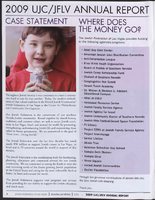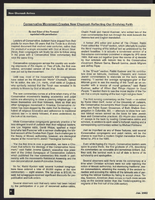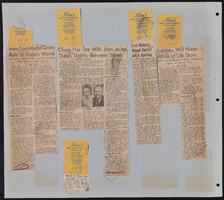Search the Special Collections and Archives Portal
Search Results
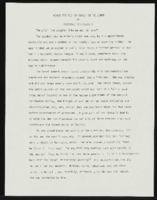
"Never Too Old To Forget Or To Learn": short story by Roosevelt Fitzgerald
Date
Archival Collection
Description
From the Roosevelt Fitzgerald Professional Papers (MS-01082) -- Short stories and poems by Roosevelt Fitzgerald file.
Text

Mario C. Monaco interview, March 12, 1981: transcript
Date
Archival Collection
Description
On March 12, 1981, Kim Rhodes interviewed Mario C. Monaco (born in Italy) about his life as an educator in Las Vegas, Nevada. During the interview, Monaco speaks about his various teaching positions, how he ended up in Las Vegas, the changes seen in the Clark County School District and how it compares to educational districts throughout the nation. Moreover, Monaco discusses wages and teacher education opportunities, sports and extracurricular activities in school, community involvement, and racial integration through busing. Lastly, Monaco talks about his appointment to Director of Vocational Education in the Clark County School Districts, the programs offered by the vocational center in the valley and the importance of education.
Text
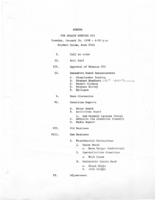
Meeting minutes for Consolidated Student Senate, University of Nevada, Las Vegas, January 24, 1978
Date
Archival Collection
Description
Text

Interview with Native American Forum on Nuclear Issues, April 10, 2008
Date
Archival Collection
Description
Text

Transcript of interview with Arby Hambric by Claytee D. White, September 23, 2015
Date
Archival Collection
Description
Arby L. Hambric's book entitled, "To Thee I See: From picking in the fields of Texas to cooking for dignitaries on U.S. Navy ships, a journey I wouldn't change," describes his profound journey from working in the cotton fields as a child to being drafted into the U.S. Navy, before completing high school. During this interview, he recalls the significant achievements of the "Red Tails" and the Tuskegee Airmen. Beginning his 20 year Navy career before military integration, Arby describes the racial tensions that plagued the U.S. Navy in the 1940s, and discusses how he was able to successfully navigate that racist environment for two decades and three war eras. Arby enrolled in San Diego State College after leaving the U.S. Navy. He also worked as maintenance personnel for Sears and Roebuck and started a catering business with his wife. He became a member of the Southern Nevada Enterprise Community, SNEC Board upon moving to Las Vegas, Nevada, after his wife died. With a family legacy he can be proud of, Arby highlights the achievements of his great grandson Taquan Mizzell, a Virginia Cavaliers running back at the University of Virginia. As a Navy veteran, Arby often volunteered his time and resources to help others in need. He recalls driving the sick and elderly back and forth from the Westside community to Valley Hospital or University Medical Center, UMC. He also discusses government enforced road closures and a wall that was built to block Blacks from entering the new downtown. This interview sheds new light on military integration and offers key strategies for overcoming environmental racism. Arby mentions a documentary about the closing of the wall and offers his predictions on the future of the Westside.
Text

James L. Hogan interview, March 11, 1978: transcript
Date
Archival Collection
Description
On March 11, 1978, collector Patty L. Baratti interviewed James Hogan (born April 6th, 1909 in Winton Place, Ohio) at his home in Las Vegas, Nevada. In this interview, Hogan talks about his time working with the telephone company in Arizona and moving to Las Vegas, Nevada. He discusses his time working on grazing rights and cattle ranching in Nevada and how planning went to ensure that farms were able to have land to graze their animals. He speaks about dealing with farmers, corporations, and the government and the frustrations he had to deal with before there were set laws about grazing. He also discusses the change from mainly family farms in Nevada to corporations owning much of the farmland.
Text

Ellen Barre Spiegel interview, December 4, 2017: transcript
Date
Archival Collection
Description
Ellen Barre Spiegel grew up in Jericho NY, a predominantly Jewish town in Long Island. Her ancestors had migrated to the United Sates prior to the outbreak of World War II. And for much of life her exposure to cultural diversity was limited. Ellen was born in 1962. She attended Cornell University, located in upstate New York, and graduated in 1984. Though the student population was 30% Jewish, the university expanded her knowledge of the world: her Protestant roommate explained that she had never met a Jew and Ellen replied, I have never met a WASP. Her college studies centered on consumer economics and she was a public policy major. Ellen was an early adopter of technology and her career path included positions at American Express, Prodigy (a joint venture of IBM and Sears), the Weather Channel, and Manufacturers Hanover Trust. Each company used her increasing experience with using technologies to improve connections with consumers. Ellen describes her Jewish identity as conservative and is a member of Midbar Kodesh Temple in Henderson. She talks about her bat mitzvah and her move back to New York to recite the mourner’s Kaddish for the year following the passing of her father. Later, she moved to Santa Monica, where she met Bill, her husband, using a new dating site called Luvitt AOL. After marriage, the couple saw financial advantages to living in Las Vegas and relocated their business and home to the valley in 2001. Soon Ellen noted that there was no active Democratic Club in Henderson and it became her mission to reignite the club. This launched a long list of political and civic accomplishments for Ellen. She has been an assemblyperson in the Nevada legislature (2008, 2013-2017). Her list of accomplishments and affiliations are on pages 46-47.
Text

